|
|
|
Sort Order |
|
|
|
Items / Page
|
|
|
|
|
|
|
| Srl | Item |
| 1 |
ID:
066895
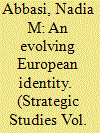

|
|
|
| 2 |
ID:
018541
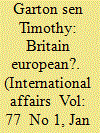

|
|
|
|
|
| Publication |
Jan 2001.
|
| Description |
1-13
|
|
|
|
|
|
|
|
|
|
|
|
|
|
|
|
| 3 |
ID:
093164
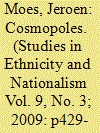

|
|
|
| 4 |
ID:
119863
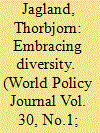

|
|
|
|
|
| Publication |
2013.
|
| Summary/Abstract |
Strasbourg, France-Any attempt to explain a transnational identity must take into account that nations, cultures, and people have always met and mixed across borders and boundaries. Europe's historically grounded diversity constitutes our true identity and gives us great strength if properly understood and respected. Over the centuries, nations have been born, and borders created or modified. The most recent wave of border changes occurred after the fall of communism. While some changes proved violent, such as war in the Balkans after the disintegration of Yugoslavia, others were peaceful. Czechoslovakia split, without conflict, into the Czech Republic and Slovakia.
|
|
|
|
|
|
|
|
|
|
|
|
|
|
|
|
| 5 |
ID:
051730
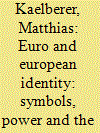

|
|
|
|
|
| Publication |
April 2004.
|
| Summary/Abstract |
This article assesses the relationship between money, collective identity, and European integration. The recent move of the European Union (EU) toward a common currency - the euro - seems to contradict the conventional 'one nation/one money' assumption about the association between states, territory and money creation. However, from a broad macro-historical perspective, the process of European monetary unification is not as exceptional and unique as it is often made out to be. I argue that the relationship between money and collective identity is reciprocal. On the one hand, money is a purposeful political tool in the construction of identities. On the other hand, in order to function properly, money requires some degree of collective identity among its users. Thus, the article examines the role of the euro as part of an explicit project to facilitate the development of a European identity as well as the required level of European identity necessary for a successful functioning of the euro. The key identity aspect at stake in the relationship between money and identity is not an affective relationship between citizens and country, but rather a relationship of trust. During the process of modernisation, trust has become rather abstract and institutionalised. To support a modern relationship of trust, identity does not have to rest on deep affective feelings of belonging. Diffuse identity, based on utilitarian or contractual factors and as part of evolving hybrid identity structures, is sufficient
|
|
|
|
|
|
|
|
|
|
|
|
|
|
|
|
| 6 |
ID:
134073
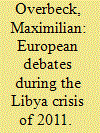

|
|
|
|
|
| Publication |
2014.
|
| Summary/Abstract |
The war in Libya of 2011 is generally portrayed as yet more evidence of the European Union (EU)'s inability to formulate a coordinated foreign policy. While the crisis took place in the EU's backyard, joint foreign policy action was hindered by member states' disagreements on whether or not to establish a no-fly zone in Libya. While this is true of political decision-makers, this paper investigates whether governmental decisions were reflected in similar divisions in national news media or whether references to European identity and criticism of European disunity transcended national media boundaries. Comparing a total of 6746 newspaper articles from Germany, France, the UK, Austria and the USA, the findings show that intergovernmental differences did not lead to similarly divided public spheres. Public debates in France, Germany and Austria constantly referred to a European foreign policy identity, though EU identity references were largely absent from UK newspapers.
|
|
|
|
|
|
|
|
|
|
|
|
|
|
|
|
| 7 |
ID:
106276
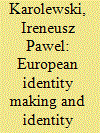

|
|
|
| 8 |
ID:
059223
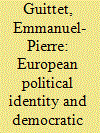

|
|
|
|
|
| Publication |
Aug-Oct 2004.
|
|
|
|
|
|
|
|
|
|
|
|
|
|
|
|
| 9 |
ID:
126797
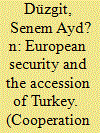

|
|
|
|
|
| Publication |
2013.
|
| Summary/Abstract |
Following a poststructuralist theorising of identity in international relations, which argues that identity is relationally and discursively constructed through foreign policy, this article attempts to analyse the way in which the European Commission discursively constructs European identit(ies) in its relations with Turkey around the theme of 'security'. The study utilises the methodological tools of critical discourse analysis in analysing the speeches and field interviews conducted with European Commission officials, in examining the way in which they construct 'Europe' in relation to the security implications of Turkish accession. The article's findings challenge the argument that Europe is moving beyond the modern state to resemble a postmodern order, and problematises the designation of the Commission as a 'cosmopolitan' actor in EU enlargement policy.
|
|
|
|
|
|
|
|
|
|
|
|
|
|
|
|
| 10 |
ID:
133963
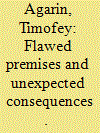

|
|
|
|
|
| Publication |
2014.
|
| Summary/Abstract |
This article discusses the relationship between three language communities in Europe with variant levels of official recognition, namely Kashub, Sorb, and Silesian, and the institutions of their host states as regards their respective use, promotion, and revitalization. Most language communities across the world campaign for recognition within a geographic/political region, or on the basis of a historic/group identity to ensure their language's use and status. The examples discussed here illustrate that language recognition and policies resulting therefrom and promoting official monolingualism strengthen the symbolic status of the language but contribute little to the functionality of language communities outside the area. As this article illustrates, in increasingly multilingual societies, language policies cut off its speakers from the political, economic, and social opportunities accessible through the medium of languages that lack official recognition locally.
|
|
|
|
|
|
|
|
|
|
|
|
|
|
|
|
| 11 |
ID:
147661
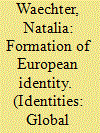

|
|
|
|
|
| Summary/Abstract |
Research into European identity has mostly focused on majority populations in Western European countries, neglecting new member states in Central and Eastern Europe (CEE) as well as ethnic minority groups. This paper contributes to filling this gap by exploring and investigating processes of European identity formation of five ethnic minority groups in four CEE countries. A generational perspective was applied by conducting qualitative in-depth interviews with three generations of ethnic minority group members. The results support the instrumental approach of identity construction. In all minority groups researched, the young generation, due to more positive personal experiences and perceived benefits from the European Union, have developed more positive images and perceptions of Europe and a greater sense of European identity than older generations. Furthermore, ethnic group-specific processes of identity formation were found.
|
|
|
|
|
|
|
|
|
|
|
|
|
|
|
|
| 12 |
ID:
083745
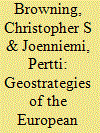

|
|
|
|
|
| Publication |
2008.
|
| Summary/Abstract |
The debate about the European Neighbourhood Policy (ENP) has, in essence, been about borders and bordering. Such departures could contribute - and often do so - to a rather fixed geopolitical vision of what the EU is about and how it aims to run and to organize the broader European space. However, this article aims to retain space for viewing the ENP as a developmental and somewhat fluid process. A conceptual framework, based on outlining three geopolitical models and a series of different geopolitical strategies employed by the EU in regard to its borders, is hence employed in order to be able to tell a more dynamic story regarding the developing nature of the ENP and the EU's evolving nature more generally. The complexity traced informs us that various geostrategies may be held at the same time at the external border. Moreover, the dominance of one geostrategy may be replaced by another or a different combination of them with regard to the same neighbourhood. It is, more generally, argued that if anything it is precisely this dynamism that should be championed as a valuable resource, avoiding the tendency to close off options through the reification of particular visions of the nature of the EU and its borders.
|
|
|
|
|
|
|
|
|
|
|
|
|
|
|
|
| 13 |
ID:
089794
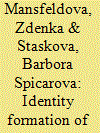

|
|
|
|
|
| Publication |
2009.
|
| Summary/Abstract |
The European Union (EU) and the concept of creating a new supranational political institution has been going through an unusually dynamic period of development in recent years. It has to do not only with the admission of a large number of new member in a very short period of time, but also with projects designed to deepen integration.
|
|
|
|
|
|
|
|
|
|
|
|
|
|
|
|
| 14 |
ID:
104108
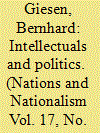

|
|
|
|
|
| Publication |
2011.
|
| Summary/Abstract |
By imagining their audiences, intellectuals invented and constructed the collective identities of nations and transnational communities like Europe or humankind. Four ideal types of intellectuals are outlined by describing them in their relation to politics: the intellectual as cosmopolitan ascetic; the intellectual as enlightened legislator; the intellectual as revolutionary; and the intellectual as the voice of a traumatic memory. These ideal types change over time in response to their focus of attention and their mode of communication. Because of changes in their media (from handwritten to printed books) and changes in their written language (from Latin to French and Italian, and further to vernacular languages), intellectuals were able to change views on past, present and future times. Today, they are involved in (civic) resistance but rarely in politics per se. By renewing the tension of the sacred and profane - the so-called axial-age revolution - contemporary intellectuals in Eastern Europe are decoupled from direct political power.
|
|
|
|
|
|
|
|
|
|
|
|
|
|
|
|
| 15 |
ID:
112152
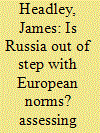

|
|
|
|
|
| Publication |
2012.
|
| Summary/Abstract |
This article examines the question of European identity in Russian foreign policy through the notion of European norms. By considering attitudes towards the death penalty, it identifies different strands of thought in the Russian elite, and argues that an assertive Europeanism is now dominant as Russia seeks to be an equal participant in the development of common norms. However, there is a tendency for Russia's 'Europeanness' to be questioned because of behaviour that is considered out of step with European Union standards. I argue that even in an area of significant controversy between Russia and other European states, self-determination for national minorities, there is potential for the delineation of common principles, but only as an inclusive process on the basis of consensus.
|
|
|
|
|
|
|
|
|
|
|
|
|
|
|
|
| 16 |
ID:
080708
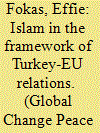

|
|
|
|
|
| Publication |
2008.
|
| Summary/Abstract |
The notion that Turkish potential membership has provoked-or exacerbated-an 'identity crisis' for the European Union is by now a familiar truism. This article is concerned with the specifically religious identity crisis sparked by the Turkish accession process to the (secular) European Union. It takes a broadly comparative approach to the role of Islam in the Turkish political sphere and the role of religion within the European Union, suggesting that a parallel examination sheds light on a number of telling similarities between the two pictures. Complex interplay between religion, secularism, national identity and European identity is a recurrent theme here. Placed within the broader framework of discussions on the place of religion in the European public sphere, this examination yields insight into the state of flux characterising religion in Europe, which, in turn, may bear repercussions for Islam in the Turkish political sphere, for Islam within the EU and for Turkey-EU relations
|
|
|
|
|
|
|
|
|
|
|
|
|
|
|
|
| 17 |
ID:
156786
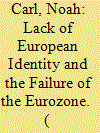

|
|
|
|
|
| Summary/Abstract |
Since late 2007, the Eurozone has been embroiled in a crisis that has seen GDP per capita stagnate, public debt soar, and unemployment reach record levels. This article argues that the Eurozone crisis will inevitably force fundamental changes in the structure of the EU. The only way to make the Eurozone work is through deeper fiscal integration of Eurozone economies. Yet wholesale fiscal integration cannot be achieved in the near term, due to the fact that EU citizens continue to identify more with their own nationalities than with Europe as a whole. The Eurozone economies of southern Europe will, therefore, continue to flounder, leading to further anti-EU sentiment. Anti-EU sentiment may eventually increase up to the point where one or all of these countries leave the Eurozone or the EU altogether. These propositions are supported with arguments from economic theory, and are bolstered by evidence from surveys and opinion polls.
|
|
|
|
|
|
|
|
|
|
|
|
|
|
|
|
| 18 |
ID:
143647
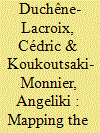

|
|
|
|
|
| Summary/Abstract |
In traditional migration theory, social self-identification is usually linked with the process and quality of integration and with the nationality of the countries of ‘origin’ and of residence. But in the context of a supranational integrated area like the European Union, the self-identification of European people living (also) abroad in another European country can be more complicated. What sorts of identity combinations do they produce in this situation? Could we interpret their choice in the light of their social, economic, cultural capitals and (multi)local integration? Based on an empirical analysis of French citizens in Berlin this article confirms that identity self-combining – not just the identity elements – and the position of the ego in the social space are related. The meaning of the same identity category depends on the respondent’s profiles.
|
|
|
|
|
|
|
|
|
|
|
|
|
|
|
|
| 19 |
ID:
113032
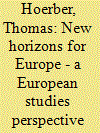

|
|
|
|
|
| Publication |
2012.
|
| Summary/Abstract |
This introduction to a special issue sets out the themes to be explored - the role of the EU in a now largely peaceful Europe, the possibilities for space to become a more important tool of EU policy and its potential for promoting further European integration and a European identity - before discussing the various papers.
|
|
|
|
|
|
|
|
|
|
|
|
|
|
|
|
| 20 |
ID:
188172
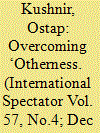

|
|
|
|
|
| Summary/Abstract |
The idea of ‘Europe’ in Central and Eastern Europe (CEE) has evolved significantly during the three decades of post-communist transition. Initially, anti-Soviet elites from the 1980s portrayed the region as equal/complementary to the Western part of the continent, which for its part perceived CEE as its ‘Other’. The first decade of post-communist transition was marked by a switch to nationalist thinking and the evocation of the idea of ‘Europe’ as one of nation-states. Finally, contemporary discourses of ‘Europe’ in CEE revolve around three different pillars, that is, European exceptionalism, European universalism and Transatlanticism, in contrast to Western discourses.
|
|
|
|
|
|
|
|
|
|
|
|
|
|
|
|
|
|
|
|
|